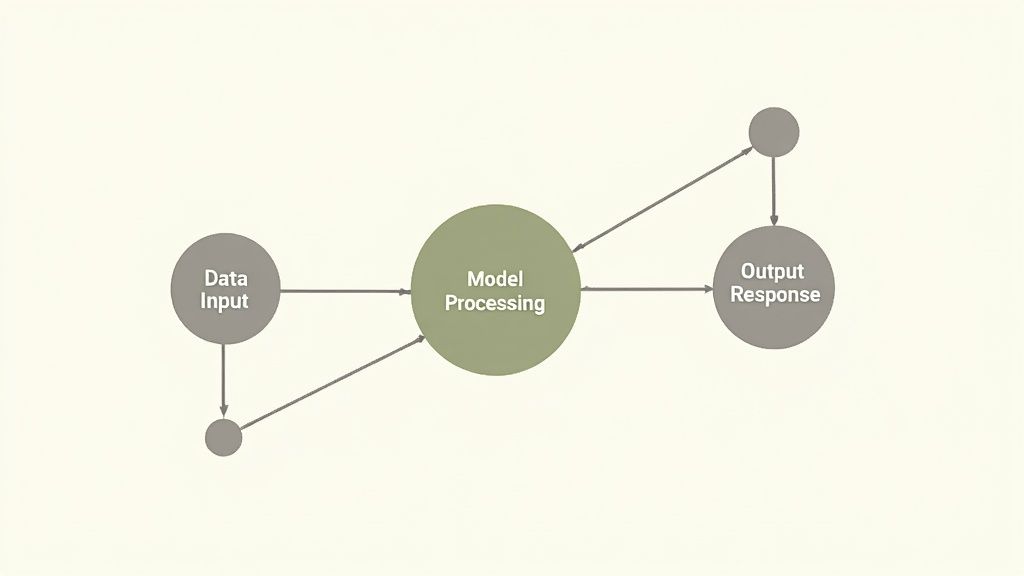By
TextSpell Editorial Team
Editorial Team
TL;DR
Discover the power of the AI answer generator to get quick, accurate solutions. Learn how this tool can enhance your questions and boost productivity.
Understanding AI Answer Generators Like Your Smartest Colleague
Imagine having a colleague who's read every book and research paper imaginable, instantly switching from explaining astrophysics to the best brownie recipe. That’s the power of an AI answer generator. But these aren’t just glorified filing cabinets.
They understand the context of your questions, responding in a surprisingly human-like way. It's more like conversing with an expert who remembers everything you've discussed and builds upon it seamlessly. Take a look at this example of an AI answer generator interface:

Notice the clean design? You can ask questions using natural language, just like a normal conversation. The system then processes your query and generates a relevant answer. Want to learn more? Learn more in our article about AI Answer Generators. This ability to understand natural language and provide contextually appropriate answers is what makes these tools so compelling.
How AI Answer Generators Process Information
These digital assistants analyze your questions, tapping into extensive knowledge networks to give insightful and genuinely helpful responses. For example, asking about the history of coffee won't just get you a date. You might also learn about global trade routes, the cultural impact of coffee houses, or even the science behind caffeine.
AI answer generators also adapt to your specific needs. For students, they can help with research and summarizing dense material. For marketers, they can assist in crafting engaging content or examining competitor strategies. This adaptability makes them a valuable asset across diverse workflows.
This sophisticated information processing makes AI answer generators much more than simple search engines. They’re like digital assistants, offering insights and crafting detailed answers tailored to your specific query. This opens up a world of possibilities, constantly expanding as the technology evolves.
The Technology Behind Smart Question Answering
Imagine trying to teach a child about the world. You wouldn't hand them a dictionary, would you? You'd talk to them, tell them stories, show them examples. AI answer generators learn similarly. Instead of dictionaries, they devour mountains of text and code, learning the nuances of human language from millions of books, articles, and online conversations.

Natural Language Processing (NLP)
Let's say you ask a friend, "What's up?" They might just say, "Nothing much." But depending on their tone of voice and body language, you might understand they’re actually having a rough day. Natural Language Processing (NLP) is like that for AI. It helps the system understand not just the words you use, but the meaning behind them, just like a good friend picking up on subtle cues.
Machine Learning (ML)
Ever notice how streaming services suggest movies you might like? They're using Machine Learning (ML). ML models are like detectives, constantly searching for patterns. They look for connections in the data they've been trained on. So, if you search for "best pizza near me," the ML model recognizes the pattern of someone looking for food recommendations based on location and cuisine. This pattern recognition helps the AI anticipate your needs and give you relevant answers. This technology is part of a growing market. In fact, the AI text generator market is expected to reach $2,176.46 million by 2032, with a CAGR of 18.1%. Discover more insights into this market.
Knowledge Graphs
Think about how Wikipedia works. You click on a link in one article, and it takes you to another related topic, and then another. That's similar to how knowledge graphs work for AI. They connect information like a vast web of ideas. If you ask about the Eiffel Tower, the AI can not only tell you when it was built, but also about its architect, its historical significance, and even nearby restaurants. This interconnectedness allows AI answer generators to offer much richer information than a simple search engine.
Essential Features That Transform How You Work
Modern AI answer generators aren't just about simple question-and-answer interactions. They're packed with sophisticated features designed to significantly boost your daily productivity. Think of it like having a highly intelligent research assistant who can quickly digest complex information and explain it in simple terms. These tools excel at understanding context and remembering the flow of your conversation, just like a helpful colleague.
Output and Customization
One of the most powerful aspects of AI answer generators is their ability to present information in various formats. Whether you need a neatly organized list, detailed paragraphs, or even creative text, these tools can adapt to your needs. This multi-format output allows you to choose the best way to present information, from concise bullet points for quick summaries to richly detailed narratives for in-depth analysis.
Many AI answer generators also offer customization options. This means you can tailor the output to match your specific writing style and communication preferences. Think of it as training your AI assistant to speak your language.
Verification and Integration
Beyond just providing answers, advanced AI tools often include features for source citation. This is crucial for verifying the information presented and building trust in the generated content. Imagine having an assistant who not only gives you the answer but also shows you where they found it.
Fact-checking capabilities are another important layer of reliability. These tools can flag potential inaccuracies in the generated content, helping you ensure the information you're using is accurate and up-to-date. To get a deeper understanding of how this technology works, it's helpful to see how AI is being used in other fields. Check out this resource on legal artificial intelligence software for more insights.
Seamless integration with your existing software is another valuable feature. AI answer generators can become a natural part of your workflow, rather than a separate tool you have to constantly switch to.
Beyond Basic Question Answering
AI answer generators go far beyond simple Q&A. They can also perform tasks like summarization, analysis, and even creative brainstorming. Have a long article you need to digest quickly? These tools can create a concise summary in seconds. Struggling with a complex problem? They can help you analyze different perspectives and generate innovative solutions.
To help you choose the right tool, let's look at some key features:
The table below, "Core Features Comparison of AI Answer Generators", provides a comparison of essential features across different tiers of AI answer generators, highlighting their strengths and limitations.
| Feature | Basic Tools | Advanced Platforms | Enterprise Solutions |
|---|---|---|---|
| Output Formats | Text, basic lists | Text, lists, tables, code | Customizable templates, API access |
| Customization | Limited | Style, tone, length | Brand voice, specific terminology |
| Source Citation | Often absent | Usually present | Comprehensive with links |
| Fact-Checking | Basic | Advanced with flagging | Real-time verification |
| Integration | Few integrations | Common platforms | Extensive API and workflow integrations |
| Advanced Features (Summarization, Analysis, etc.) | Limited | More robust | Highly specialized and tailored |
This table summarizes the key differences in features offered by basic, advanced, and enterprise-level AI answer generators. As you can see, the more advanced the platform, the more sophisticated the features and integration options become.
The infographic below illustrates key metrics for evaluating these tools:

This visualization shows how accuracy, response time, and user satisfaction are vital when choosing an effective AI answer generator. The right tool for you will strike the perfect balance between these factors. For example, if accuracy is paramount, you might prioritize that over a faster response time. You might also be interested in our grammar checker, which integrates seamlessly with our AI answer generation capabilities. These combined features make AI answer generators a valuable asset for increasing efficiency and boosting productivity.
Real-World Applications Across Industries

AI answer generators are changing how we work across many different fields. They’re not just for simple research anymore. Let’s explore how these tools are becoming valuable partners in various professional workflows.
Marketing and Content Creation
Imagine Sarah, a marketing director. She’s constantly juggling competitor analysis, campaign brainstorming, and crafting compelling ad copy. An AI answer generator becomes her trusted assistant, helping her analyze competitor strategies, generate fresh campaign ideas, and even write engaging ad copy. This allows her to stay ahead of the curve and connect with her audience more effectively. Most importantly, it frees up valuable time that she can dedicate to other strategic tasks.
Content creators also find these tools invaluable. Think about those times when writer’s block hits. An AI answer generator can be a great sparring partner, offering fresh perspectives and helping writers explore new ideas. Through a process of questions and feedback, the AI helps refine those initial sparks into high-quality content.
Academic Research and Learning
Let's consider Marcus, a graduate student. He’s facing a mountain of research papers and complex concepts. For him, an AI answer generator becomes a powerful tool for navigating the complexities of academic life. He uses it to sift through research papers, create study guides, and even clarify tricky concepts. Of course, Marcus knows the importance of academic integrity. He uses the AI as a learning aid, not a shortcut to plagiarism, ensuring his work remains original and insightful. You might find similar academic support through resources like TextSpell’s Homework Helper.
Customer Support and Healthcare
AI’s impact extends to customer support too. AI-powered answer systems are enhancing how businesses interact with their customers. These systems can provide quick, comprehensive, and helpful answers to common inquiries, boosting customer satisfaction and freeing up human agents to handle more complex issues.
Even healthcare is experiencing the benefits of AI. Specialized AI generators are being used in medical research, patient education, and to keep healthcare professionals informed about the latest treatment protocols. This faster dissemination of vital information benefits both patients and providers alike. The larger picture shows just how impactful AI is becoming: the global AI market is projected to surpass $800 billion by 2030, with AI-driven sales expected to reach $1.3 trillion. For a deeper dive into these figures, check out more about AI market statistics.
Adapting AI to Your Needs
These real-world examples demonstrate the practical value AI answer generators bring to different sectors. The key takeaway is to understand how to adapt these tools to your own professional needs. Whether you're a student, marketer, writer, or healthcare professional, integrating AI into your workflow can increase productivity, simplify complex tasks, and open up new possibilities.
Choosing Your AI Answer Generator Match
Imagine walking into a well-stocked toolbox. You wouldn’t grab a wrench to drive a nail, right? The same principle applies to AI answer generators. Each tool has its strengths, and finding the right one depends on the task at hand. This section helps you navigate the options and discover the perfect fit for your needs.
Identifying Your Needs
Before we dive into the specifics, let’s clarify what you’re looking to achieve. Think of it like planning a trip: knowing your destination helps determine the best route. Are you a student needing help with research? A marketer crafting compelling content? Or a business owner seeking efficient solutions for complex questions?
-
Casual Users: For quick answers to everyday questions or light research, free options like ChatGPT and Google's Bard are great starting points. They’re like helpful companions for students or anyone seeking general knowledge.
-
Professionals: If you require deeper analysis, content creation, or business-focused applications, consider professional tools like Claude. These platforms offer advanced capabilities such as summarization and in-depth analysis, similar to having a dedicated research assistant.
-
Enterprises: Larger organizations often benefit from enterprise-grade solutions. Think of these as custom-built workshops with specialized tools. These platforms offer enhanced security, tailored training, and seamless integration with existing systems.
Evaluating Key Features
Once you’ve pinpointed your needs, let's explore the key factors for choosing the right tool. It’s like checking the engine specs before buying a car – you want to make sure it performs as expected.
-
Accuracy: How reliable are the answers? This is like checking the precision of a measuring tool. Look for platforms with high accuracy rates to ensure dependable information.
-
Response Speed: In today’s fast-paced environment, time is of the essence. A quick response time is crucial, just like having a reliable delivery service.
-
Integration: Does the tool integrate smoothly with your existing software? Seamless integration streamlines workflows and enhances efficiency, much like having compatible parts in a machine.
-
Cost-Effectiveness: Balancing features with budget is important. Free options offer basic functionality, while professional tools offer advanced capabilities for a fee. It’s about choosing the right balance for your specific needs.
Platform Strengths and Considerations
Just as different instruments play different roles in an orchestra, various platforms excel in specific areas. Some are great for creative writing, while others are better suited for technical queries. Some shine at research and analysis, making them ideal for academics and professionals.
Beyond the core functions, consider these additional factors:
-
Data Privacy: How is your data handled? Choose a platform that prioritizes data security and privacy. This is like choosing a trusted vault to protect your valuable assets.
-
Offline Capabilities: Do you need offline access? This can be essential for travelers or anyone needing access in areas with limited connectivity. Think of it as having a backup power source.
-
API Access: Do you need to integrate the tool with other applications? API access provides powerful customization and automation options, much like having the ability to modify and upgrade your tools.
-
Scalability: Can the platform grow with your needs? Consider future requirements when making your decision. This is like choosing a vehicle that can accommodate your current and future cargo needs.
To help you navigate the options, let's take a look at a practical comparison.
AI Answer Generator Selection Guide
The table below provides a quick overview of recommended tools for different use cases. It's like a cheat sheet to help you make the best decision.
| Use Case | Recommended Tools | Key Features | Pricing Range |
|---|---|---|---|
| Quick Answers & Light Research | ChatGPT, Google's Bard | Ease of use, general knowledge | Free (with optional paid plans) |
| In-depth Research & Content Creation | Claude | Advanced summarization, analysis | Paid (various tiers) |
| Enterprise Solutions | Custom platforms | Robust security, custom training, integrations | Varies depending on vendor and requirements |
By considering these factors and exploring the available options, you can confidently choose the AI answer generator that best aligns with your specific needs and goals.
The Explosive Growth Creating Better Tools
The world of AI answer generators is buzzing with activity. Think of it like a bustling marketplace, with new stalls popping up all the time, each offering the latest and greatest in AI-powered tools. This rapid evolution means better features, improved accuracy, and easier access for everyone.
What's driving this exciting growth? A lot of it comes down to friendly competition between tech giants like Google, Microsoft, and OpenAI. As these companies race to develop the most advanced AI, we users reap the rewards. We get more accurate answers, interfaces that are intuitive and easy to use, and even solutions tailored to specific industries. Need help crafting social media posts? Tools like the AI Social Media Content Generator are becoming increasingly sophisticated and readily available.
Beyond Simple Queries
Our interactions with AI are changing dramatically. Remember when we could only ask simple questions? Now, we can have natural, flowing conversations about complex topics. It's like having a knowledgeable colleague always on hand to help you brainstorm and solve problems. This advancement is partly due to how seamlessly these AI tools integrate with the software we already use.
Imagine needing to understand a complex technical concept. Instead of just getting a text answer, your project management software automatically generates a helpful diagram alongside it. That's the power of integration – boosting efficiency and making collaboration smoother than ever.
AI for Everyone
This rapid progress also means AI is becoming more accessible. Features that once seemed futuristic are now part of our everyday lives, and they're improving at an incredible pace. Increased investment in AI research and development is a key factor here. The AI answer generator market, valued at approximately $2.7 billion USD in 2024, is projected to reach a staggering $8.5 billion USD by 2032, according to HTF Market Insights. Discover more insights about the AI market. This investment translates into more affordable options, better free tiers, and greater accessibility, putting the power of AI into the hands of more people.
Staying Ahead of the Curve
In this fast-paced environment, staying informed is crucial. Understanding the latest trends allows us to make smart choices about which tools to use and how to best integrate them into our work. By keeping up with these advancements, we can ensure our AI strategy is future-proof and that we’re maximizing its potential.
Mastering AI Answer Generators For Best Results
Ready to truly get the most out of AI answer generators? It's not just about typing in a question—it's about learning how to best interact with these powerful tools. Think of it like learning to ride a bike: it takes practice and a bit of finesse.
Crafting Effective Questions
The first step is asking the right questions. Specificity is your secret weapon here. Instead of a general query like "What is marketing?", try something more focused, like "What are the most effective digital marketing strategies for a small bakery trying to increase local foot traffic?". The more specific you are, the more targeted and helpful the AI's response will be.
That being said, don’t be afraid to explore unexpected avenues. Sometimes the most valuable information comes from asking open-ended questions and being open to surprising answers. It's like wandering through a library—you might go in looking for one book, but end up discovering a hidden gem in a completely different section.
Iterative Questioning and Verification
Iterative questioning is another valuable technique. Start with a broad question, then refine it based on the initial responses. This helps you dive deeper into a topic and uncover nuanced insights. Imagine you're a detective solving a case: you start with a general idea of what happened, then gather clues to piece together the whole story.
Equally important is verifying the information you receive. While AI answer generators are impressive, they aren't infallible. Always double-check information, especially for important decisions. It’s like using a map to navigate: you still need to pay attention to your surroundings and make sure you're on the right track.
Advanced Techniques and Collaboration
Experienced users often use advanced techniques like maintaining context. This means carrying over the conversation's history across multiple interactions. Think of it like having a conversation with a friend: you both remember what was said earlier and build upon it.
Another key skill is combining the AI’s insights with your own knowledge. The AI provides information, but you bring critical thinking, creativity, and personal experience to the table. Think of it like collaborating with a colleague: you each bring different strengths to the project.
Finally, cultivate a collaborative mindset. Don't just treat the AI like a search engine—treat it like a thinking partner. Challenge its assumptions, ask follow-up questions, and encourage it to explore new ideas. This collaborative approach truly unlocks the power of AI answer generators.
Ready to experience seamless AI writing assistance? TextSpell offers a comprehensive suite of tools to elevate your writing, from grammar checks to AI-powered content generation. Explore TextSpell and transform your writing today!
FAQ
What does this guide cover?▾
Discover the power of the AI answer generator to get quick, accurate solutions. Learn how this tool can enhance your questions and boost productivity.
Who is this guide for?▾
Readers interested in ai answer generator, AI tools, question answering.
How should I use this information?▾
Skim the TL;DR, then jump to the sections that match your goal and take action on the recommendations.

